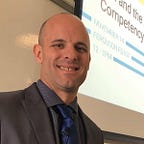My “Skills” Story
When I was public school educator from 2005 to 2015, I loved my job and my students.
After several years of site-based leadership and involvement, I was given the opportunity to do more — curriculum leadership by grade level, then district wide curriculum development opportunities in 2012–2013 thanks to a principal (Jeremy Ward) who encouraged me to share my knowledge even though I felt like I was too young at… 28. While it was easy to show to others I was good at mathematics curriculum related things, I often felt like I wasn’t able to use ‘everything’ I knew. For example, I was always pretty proficient at computers but discussions about implementing Google Classroom fell on mostly deaf ears because — gasp- I wasn’t in IT, but just a teacher who desperately needed a way to deliver online instruction to students without writing a bit.ly link on the board every day. But a lot was happening my life(buying a house, getting married etc)so I was able to keep moving along without getting too frustrated.
Professional Development — What Teaching Calls UpSkilling
As a teacher, I loved professional development because I enjoyed collaborating and learning from other teachers. Also, as a teacher-coach I spent most of my time with high schoolers, and it was refreshing to be around adults the entire day!
But there was something missing. Once I was out of the classroom and could think about systemic issues easier, I started asking questions like:
- Do we know how many teachers have had (for example) SDAIE training and if that improved outcomes?
- What non-core-instructional skills do teachers have that are not being utilized(eg, I knew how to use Geogebra, an online geometry and calculator program, but not many others did not).
Teaching Channel Opened The Door To EdTech
In 2014 I eventually got a new job in Fresno Unified as a Teacher on Special Assignment in the professional development department. Specifically, I was tasked with helping lead teachers to do self-reflective video-based professional development. I’d gotten involved in a program FUSD had invested in the previous year called Teaching Channel/TCH TEAMS, which was was a great library of videos that showed exemplary practices for teaching the new Common Core standards, but also had a fairly active discussion forum.
Ryan Coe and I at the time started talking about linking Teaching Channel to outcomes in the districts PD system while we were all creating professional development courses for a ‘column 5’; that helped teachers earn additional income from taking district-specific professional development courses. I didn’t even now about this article from 2016 until recently, but it was a big deal:
The excitement of the work I was doing at Fresno Unified helped catch the eye of my next employer, OpenEd, an open educational resources company and I accepted the job as Lead Content Curator. I wanted to help hundreds of thousands of students and teachers be able to have high quality instructional resources for their classrooms. And guess what, it all related back to aligning that content to defined content standards.
Fast Forward to Now
One of the greatest things about developing the professional learning courses and working with Teaching Channel was being able to engage in my core job with capabilities I already had, but needed an opportunity to be developed. I think all employees want this — we’re not simply a job description, we’re people and always bring much more to the table than just what we’re paid to do. When the opportunity to join Empath as Director of Skills Content came along, after growing and learning in my own core competencies of machine-readable skills and learning at ACT, I jumped at the chance. It’s exciting to be involved in work to help give people and their employers visibility into the skills they already have and are doing — and also probably the most challenging job I’ve ever had!
Skills aren’t just a buzzword. It’s not just about showing employers what an employee knows — it’s showing them who they are.
